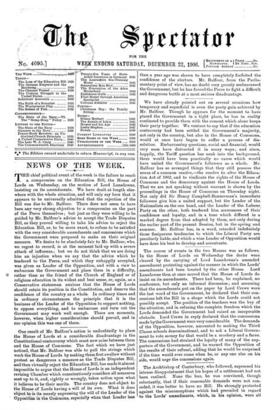The course of events in the two Houses was as
follows. In the House of Lords on Wednesday the decks were cleared by the carrying of Lord Lausdowne's amended amendment protesting against the manner in which the Lords' amendments had been treated by the other House. Lord Lansdowne then at once moved that the House of Lords do insist on its amendments. There had been, he explained, no conference, but only an informal discussion; and assuming that the amendments put on the paper by Lord Crewe were the last word of the Government, he declared that their con- cessions left the Bill in a shape which the Lords could not possibly accept. The position of the teachers was the key of the situation, and in refusing the complete freedom which the Lords demanded the Government bad raised an insuperable obstacle. Lord Crewe in reply declared that the concessions made by the Government were very considerable. The demands of the Opposition, however, amounted to making the Third Clause schools denominational, and to ask a Liberal Govern- ment to vote money for that would be a mockery and a farce. The concessions had strained the loyalty of many of the sup- porters of the Government, and he warned the Opposition of the results of their refusal, adding that he would be surprised if the time would ever come when he, or any one else on his side, would urge the concessions again.






































